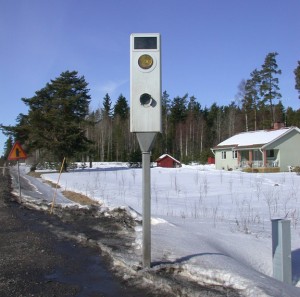TALLINN — The Estonian Road Administration has finished installing six fixed-location speed cameras on what it says is Estonia’s most dangerous stretch of road, the highway between Tallinn and Tartu, with another 10 cameras to be installed with the next month.
The 14.4 million krooni (€920,000) investment into road safety is the first major purchase of such equipment because previously Estonian law did not allow the use of speed measuring devices, experts told Baltic Reports.
“There is a road safety plan. The speed cameras are part of this plan and it has been an issue for two years. This year from December, police will start measuring the speed with cameras,” Timo Vijar, administration press specialist told Baltic Reports. “At the moment they are testing them. Six are in place and the rest will come soon — over the next month we will make more analysis and then police will start using them.”
Estonia’s national police force confirmed that the devices, which will have a tolerance of seven kilometers per hour, would not be used until December.
“This project is in the test state. The Estonian Road Administration is responsible for it for now — they are only just putting the camera’s out and testing them now,” police spokeswoman Tuuli Härson told Baltic Reports.
The 65 km stretch of road where cameras are being installed is the country’s worst black spot. On any given day, the road can have between 5,000 and 7,000 cars use it, with more on the weekend.
“Our first analysis shows that around six percent go faster than allowed — this is for the testing period. When the opening day arrives, it should drop under five percent,” Vijar said. “Most of the drivers are going two or three kilometers over the limit. Ninety percent of drivers drive with 90 to 92 km per hour.”
Vijar said that although this was the country’s worst spot for accidents, there are plans for other locations soon.
The seven kilometer tolerance in speed is for two reasons — technical leeway and policing techniques.
“Precision is not problem, it is just how the things are. Every technical instrument that measures speed has some plus and minus difference from the exact speed,” Vijar said.
On Jan. 28 this year, the Estonian Road Administration and Alarmtec AS signed a contract for the purchase and installation of the cameras for the Tallinn-Tartu highway.
According to the contract the contractor must develop the system as a whole, which including 16 fully-automatic camera installations with connections in real-time to data centers. They must also create the data center and do maintenance and recalibration for five years. Speed cameras are equipped with security and alarms.













